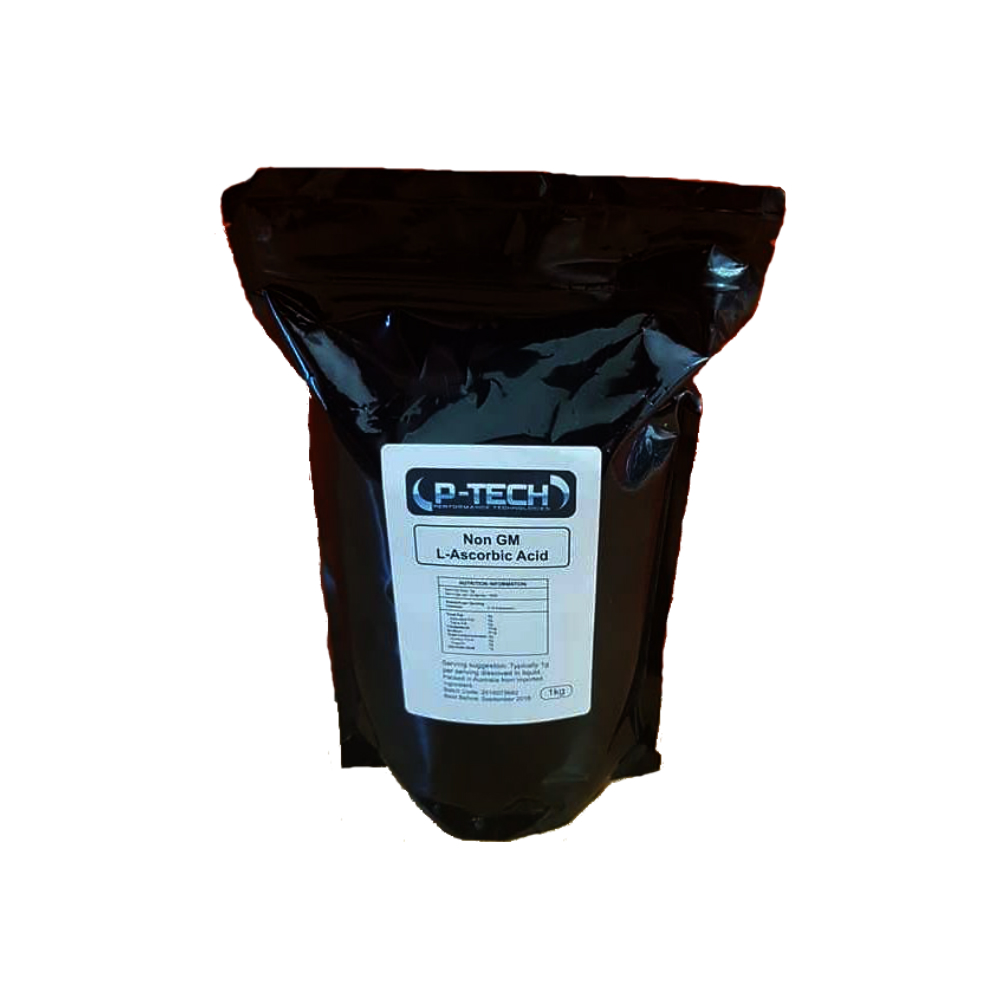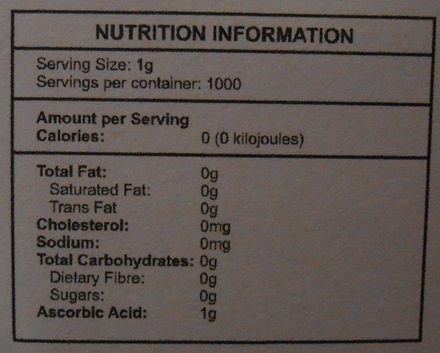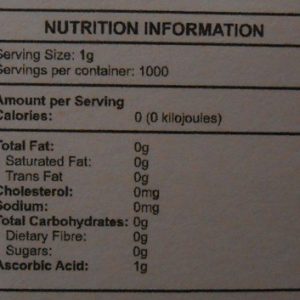Vitamin C (L-Ascorbic Acid) Powder
$59.95 Original price was: $59.95.$39.95Current price is: $39.95.
Vitamin C is a water soluble nutrient well known for its vital role in the immune system. Vitamin C is also necessary for the production of collagen (a structural protein in connective tissue) and is therefore important for skin, bone and joint health. Vitamin C is needed for amino acid metabolism and the utilization of many nutrients, such as folic acid and iron. It is also a highly effective antioxidant that can protect the body’s cells and molecules from damage by free radicals and reactive oxygen molecules generated during normal metabolism and exposure to environmental stress.
Vitamin C is a water soluble nutrient well known for its vital role in the immune system. Vitamin C is also necessary for the production of collagen (a structural protein in connective tissue) and is therefore important for skin, bone and joint health. Vitamin C is needed for amino acid metabolism and the utilization of many nutrients, such as folic acid and iron. It is also a highly effective antioxidant that can protect the body’s cells and molecules from damage by free radicals and reactive oxygen molecules generated during normal metabolism and exposure to environmental stress.
15 Benefits of Vitamin C
1. Helps treat common cold symptoms: The role of vitamin C in preventing cold has always been controversial. Although there is no evidence that vitamin C can prevent cold, several studies have shown that vitamin C can reduce the severity of cold symptoms and the duration of cold. Vitamin C is a natural antihistamine and therefore helps in controlling allergies by reducing the levels of histamine.
2. Natural cure for skin problems: Since olden times, vitamin C has been used to treat a lot of skin-related problems. Today, vitamin C is used in a lot of moisturizers, face packs and masks for rendering natural glow to the skin. Vitamin C is helpful in reducing wrinkles and preventing sagging skin by improving the elasticity of. It also helps to protect the skin from harmful UV rays of the sun. Here are some tips to prevent wrinkles and other signs of aging.
3. Helps heal wounds: Vitamin C is an essential factor required for the production of collagen, a protein present in connective tissues of the body (skin, tendons, muscles, ligaments etc). Therefore, vitamin C is especially helpful in healing wounds of all types. From minor cuts to deep wounds, broken bones and burns, vitamin C speeds up the healing process and helps you to recover faster.
4. Protects against ill effects of stress: It is official that vitamin C has an important role to play in protecting the brain and nervous system from the harmful effects of stress. This is because sufficient levels of vitamin C are required for the synthesis of stress hormones like adrenaline and nor-adrenaline, which play a role in fight-or-flight mechanism of combating stress.
5. Helps lower cholesterol: Vitamin C plays a crucial role in reducing the level of cholesterol in the blood. It is basically boosts the conversion of cholesterol to bile salts which can be easily eliminated from the body. Here is how you can reduce cholesterol levels naturally.
6. Improves blood flow: Most of the damage caused to the blood vessels during a heart attack is because the blood vessels do not dilate, obstructing the blood flow. Chest pain or angina is also caused by the inability of coronary arteries (arteries that carry blood to the heart) to dilate. Studies have found that even small doses of vitamin C can help in improving dilation of blood vessels in people suffering from angina pectoris, congestive heart failure and high blood pressure.
7. Lowers the risk of heart diseases and stroke: Vitamin C has an excellent antioxidant property. It scavenges free radicals that can cause damage to the wall of arteries and increase the risk of heart diseases and stroke. Plus, it also lowers cholesterol and improves blood flow, which also helps to prevent heart diseases.
8. Regulates sugar levels in diabetics: Although diabetics have a lot of food restrictions to follow, they can surely benefit from foods containing vitamin C. It regulates blood sugar levels and also protects against the complications of diabetes.
9. Helps cancer treatment: A study had suggested that high-dose of vitamin C can enhance the cancer-killing effect of drugs used in chemotherapy for cancer patients. Vitamin C has also been found to be target specific unlike other drugs which can harm normal cells as well. Researchers believe that vitamin C can be a safe and cost-effective treatment for ovarian, lung and some other cancers.
10. May reduce the development of neurological disorders: A German study found that the blood levels of vitamin C, beta-carotene and lycopene are were extremely low in patients having with mild dementia. This suggests that boosting vitamin C levels may help in reducing the progression of dementia and other neurological conditions like Alzheimer’s disease (AD).
11. Helps reduce breathlessness: A study from University of Helsinki, Finland suggested that vitamin C substantially reduces bronchoconstriction, narrowing of airways, caused by rigorous physical activity and exercise. Brochoconstriction can cause symptoms such as cough, wheezing and the shortness of breath.
12. Improves asthma symptoms: People having chronic asthma can benefit a lot from vitamin C. Vitamin C, being an antioxidant and antihistamine, improves the function of lungs and airways. It is found that vitamin C doses of 1,000 to 2,000 mg per day may reduce the production of histamines, which contributes to inflammation in asthmatic people.
13. Helps reducing arthritis symptoms: Arthritis is caused by the collapse of cellular processes that help in the production, maintenance and repair of cartilaginous tissues. Physical stress on the cartilage can cause destruction of collagen and can also interfere in its production. Since vitamin C is required for collagen production it helps to reduce pain, inflammation and swelling of joints in people with arthritis. It also helps in maintaining healthy joints and keeping them flexible.
14. Reduces risk of cataracts: Vitamin C plays a role in improving vision but it also prevents the development of cataracts (clouding of eye lens) that causes blindness in older people. This is because your eye lens needs high amount of vitamin C to eliminate all the free radicals that generate due to direct exposure to sunlight.
15. May help treat tuberculosis: One of the recent studies published in Nature communications found that vitamin C can kill the bacteria causing tuberculosis. Although the antibacterial potential of vitamin C is still to be tested in humans but the findings were striking and worth exploring.
What is Vitamin C deficiency?
Vitamin C deficiency, as the name suggests is due to the lack of Vitamin C in your body. Over a period of time, a deficiency of Vitamin C hampers the formation of collagen, which in turn leads to the breakdown of tissue in the body, affecting the process of repair within the body. If the deficiency of Vitamin C goes on for over three months, it could lead to scurvy.
Think you might have the deficiency? Here are the common symptoms that might help you decide.
Fatigue
Do you tire easily without really knowing why? Fatigue can be attributed to a deficiency of Vitamin C. Tiring easily, feeling like you are always low on energy are hallmark symptoms of vitamin C deficiency. That being said, fatigue is a common symptom of other conditions too, making diagnosing the cause that much more difficult.
Changes in your mood
If you are suffering from a deficiency in Vitamin C, you could be prone to becoming irritated easily and feeling irritable all the time.
Sudden weight loss
You could also experience sudden weight loss as a result of Vitamin C deficiency. While this discovery could make you jump for joy, it isn’t necessarily the healthiest way of losing weight. When your body starts losing vital nutrients, losing weight is a way to compensate. Losing weight this way is definitely not good for your body.
Muscle and joint aches
A lack of Vitamin C in your diet could ultimately lead to the development of chronic pain in the muscle, joints and limbs. Also, you could experience stiffness in your joints if you make sudden movements. However, these symptoms can also be attributed to other conditions and diseases as well.
Bruising easily
People with a Vitamin C deficiency will also bruise quite easily. Since the vitamin is required to keep your body in balance, a lack of it can cause you to bruise easily. Therefore, any sign of excessive bruising usually means that your body needs some immediate medical attention.
Dental problems
Vitamin C will helps keep your teeth and gums healthy and problem-free. However, Vitamin C deficiency could cause dental deterioration. If not tended to immediately, periodontal problems could have hazardous consequences as a result. This sort of deficiency can be termed as ‘scurvy’. Mariners usually develop this condition because they have very little access to nutrients when they are away sailing at sea. It should be noted that it is quite a frightening condition and requires immediate medical attention.
Dry skin and hair
If you are experiencing a change in skin and hair texture, chances are that your body is not receiving adequate amount of Vitamin C in addition to other necessary minerals and vitamins.
Lowered immunity
When a person is suffering from a deficiency of vitamin C, it can have a negative impact the body. This is especially true when it comes to wounds healing and fighting off infections. This is because the immune system weakens as a result of this deficiency. When the white blood cell count decreases, your body is incapable of fighting off infections, making you more prone to contract common infections.
| Size |
|---|
Be the first to review “Vitamin C (L-Ascorbic Acid) Powder” Cancel reply
You must be logged in to post a review.
Related products
Anti-Stress
Body Building
Anabolic Formulas
Body Building
Body Building
Nootropics
Nootropics
Fat Burners
















Reviews
There are no reviews yet.